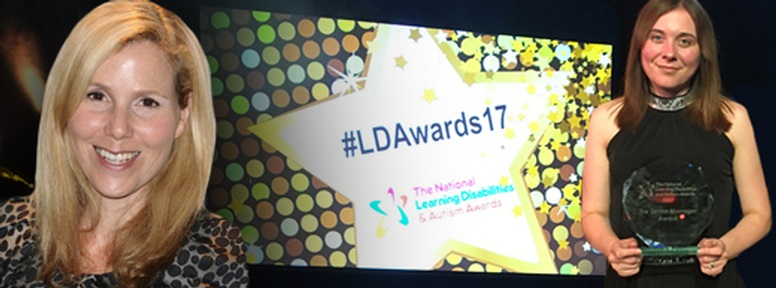Actress Sally Phillips honours autism nurse for being a 'true champion'
A consultant nurse dedicated to supporting people with autism and learning disabilities has received national recognition at an award ceremony hosted by actress Sally Phillips.
 Amy Childs won the ‘Senior Manager Award’ at The National Learning Disabilities & Autism Awards 2017, and is considered a ‘true national champion’ for having a positive impact on people’s lives.
Amy Childs won the ‘Senior Manager Award’ at The National Learning Disabilities & Autism Awards 2017, and is considered a ‘true national champion’ for having a positive impact on people’s lives.
Ms Childs’ career in the care sector began 16 years ago, working with people who have disabilities as a support worker. In 2006, she qualified as a nurse specialist in autism and complex needs and progressed to become a manager of Wast Hills Specialist Autism Hospital in Birmingham.
It was at this point in her career where she was ready for the next step, and in May this year Ms Childs progressed to become a consultant nurse at the Danshell Group, which cares for adults with a learning disability or autism in specialist hospitals and residential services, both with and without nursing.
Nurturing life-skills
“Becoming a consultant nurse is an exciting leap into leadership within the nursing profession,” explains Ms Childs. “It veers away from management and towards the clinical aspects of nursing.”
She says while there are some situations in working with people with complex needs that may be a challenge, her view is that the positives far outweigh any difficulties. Obstacles that may arise can be overcome with patience, hard-work, empathy and professionalism.
“The most enjoyable aspect of my role is empowering people who had once been unwell, with a limited quality of life, and nurturing their life-skills so they are able to live independently at home with family and friends.”
Busy mum still finds time to study
A ‘typical day’ for Ms Childs begins at the University of Wolverhampton, where she gives a lecture to trainee nurses. This can be followed by preparing for a Governance meeting, looking at a supervision training programme and at ways it could be refined and improved.
Her afternoons are then spent in local care homes and hospitals, supporting staff, revising care plans and sharing best practice to the team. In the evenings, after sorting out the washing and making her children’s tea, Ms Child’s often takes to her studies for an hour – as she is studying for a Masters in Positive Approaches to Challenging Behaviour Support at Cardiff University.
During this time, she can receive phone calls from a home asking for advice on how to deal with a challenging issue.
‘Brought a tear to my eye’
“The main challenge we face is when an individual we support is admitted and might be acutely unwell or even distressed,” reveals Ms Childs. “What recently made me smile and also brought a tear to my eye, was a gentleman whose life changed after being supported at one of our hospitals. He historically had needs that required residential hospital care for 30 years and had a very limited contact with the outside world.
“We were aware that he had not seen his sister for many years, and so we helped arrange a reunion for them which was a delight to see and be part of. To see a person who had been so isolated reunited with his sister was a touching moment for everyone involved and now he meets with her regularly.”
Those with autism do have emotions
According to Ms Childs, the biggest misconception she has experienced during her career is that people mistakenly believe individuals with autism do not have emotions, do not like society and do not want to have friends.
“This is far from the truth,” she says.
“I know this first-hand on a professional and a personal level. One of my daughters is autistic, so for me it is plain to see that these misconceptions simply are not true; the difference is that autistic people find it a challenge to express their emotions and convey their thoughts and feelings. Their emotions are as varied and deep as anyone’s.”
Making the difference in a person’s life is ‘more than worth it’
For anyone thinking of becoming a consultant nurse, Ms Childs offers this advice: “Find the elements of nursing that are your passion and strength, then become an expert in this field. Share your learning with others and ask someone you look up to in management to mentor you so you develop the people skills needed for this exciting role.
“Making the difference in just one person’s life makes all the effort and dedication this career requires more than worth it.”
Latest News
 29-Jul-24
Dementia Bus gives carehome.co.uk staff insight into life with dementia
29-Jul-24
Dementia Bus gives carehome.co.uk staff insight into life with dementia
 01-Mar-24
Find out the top care homes in 2024
01-Mar-24
Find out the top care homes in 2024
 21-Mar-23
UK's top care homes in 2023 revealed
21-Mar-23
UK's top care homes in 2023 revealed
 03-Jan-23
carehome.co.uk launches free care helpline
03-Jan-23
carehome.co.uk launches free care helpline
 13-Dec-22
5 mins with Emily Whitehurst, chief operating officer for Constantia Healthcare
13-Dec-22
5 mins with Emily Whitehurst, chief operating officer for Constantia Healthcare